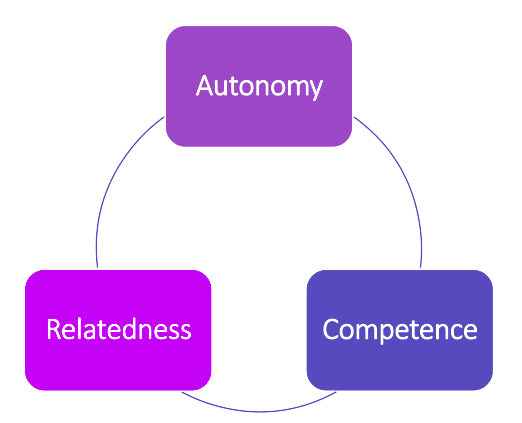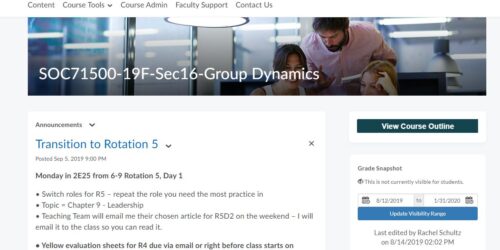
Discussion Forums
The goals of this post is to:
- Describe the asynchronous discussion forum and some of the common purposes of the forum
- Identify ways to promote discussion norms, quality participation, and community
- Discuss common situations when the discussion activity needs faculty support
About Discussion Forums
The Discussions tool in eConestoga (Fig. 1) is a collaboration area where the professor and students may
- post, read, and reply to threads on different topics
- share thoughts about course materials
- ask questions, share files, or work with your peers on assignments and homework.
Forum discussion forums are used in fully online (asynchronous) courses as well as hybrid courses at Conestoga. They may be utilized in in-person and synchronous online courses so long as the activities take place during class.
Why discussion forum?
The discussion forum simulates some aspects of real-time discussion activities in class. Primarily, the discussion forum is a space for civil and constructive discussion that supports and/or demonstrates learning outcomes. Discussions are beneficial because they can:
- Supplement content
- Help students feel engaged
- Offer opportunities to apply knowledge in a practical and meaningful way
- Foster collaborative learning
- Provide opportunities for in-depth, thoughtful reflection and responses
- Develop analytical skills and critical thinking skills.
- Provide opportunities to correct misunderstanding
- Explore other perspectives different from their own
- Promote interaction between students within a learning community
- Provide students with opportunities to demonstrate their knowledge and progress their learning towards course outcomes
What motivates students to post (or not post), according to self-determination theory?
To be self-determining means to engage in activities with a full sense of choice and personal agency. Students who are self-determined have a desire to express themselves and act in their interests (Ryan & Deci., 2017).
Being able to be self-determined and self-regulating is good for learning. These abilities underly motivation, learning, and thinking about learning.
According to Ryan and Deci (2017), there are 3 key psychological needs that motivate self-initiated behaviours in learning (Fig. 2). They are
- Autonomy refers to initiating and regulating one’s actions
- Competence involves performing actions to outcomes
- Relatedness refers to developing connections that allow one to feel safe, secure, and seen
Students who are self-determined are more likely to have a higher motivation to post in discussion. However, in a recent study, students perceived lower levels of these aspects of self-determination in online courses compared to face-to-face courses (Filak & Nicolini, 2018). How can we encourage autonomy, competence, and relatedness in online courses to encourage active and quality student posts?
Boost Autonomy: Create Norms
- Be clear about what you want students to achieve with discussion, e.g., participation correlates with learning and performance (Bonafini et al., 2017)
- Describe when, how, and how much
- Give concrete tips for being successful
- Encourage respect and do not tolerate rudeness
- Describe student accountability and consequences of non-participation
Students may not always agree or have the same perspective in this course, and that’s okay. You are encouraged to share, listen, and respond to each other’s ideas. However, respectful communication amongst classmates is required in an online discussion forum. Emphasize that rude, discriminating, and harassing behaviour will not be tolerated.
Here is an example of a short explanation of expectations for posting in discussion forum.
I expect you to participate in a timely and frequent manner, at least twice a week. This means that you should be actively posting and contributing to the discussion on a regular basis. By posting weekly, you will be able to apply what you have learned and engage with the course in a way that will help your learning.
Additionally, by responding to others’ posts, you will create a sense of community and increase your own engagement in the online course. Remember, the discussion forum is not just for sharing your thoughts, but also for learning from others and creating a positive and productive learning environment. This not only helps you to learn and apply the material but also helps to create a sense of community, a vital component of an online course.
See these different examples of norms-making for students who use the course discussion forum. Adapt the content and/or structure to your course contexts.
- Discussion Guidelines [Educause] – Google Docs
- Ground Rules for Online Discussion
- Common Pitfalls of Discussion Board Responses
Boost Competence: Scaffold and Build
Students may be unfamiliar with not only the course content but also how to use discussion posts. By scaffolding students’ use of the discussion forum, you can gradually shift the responsibility of student agency and voice to learners.
Here are some tips for ways to build student confidence and competence in the discussion boards:
- Form clear, specific, open-ended questions or problems that relate to outcomes, learning materials, and assignments
- Model a strong discussion post (e.g., align with rubric, incorporate the learning materials)
- Encourage students to respond to complementary and contrasting ideas and perspectives
- Provide class-wide prompts, summaries and coaching in Announcements/email to progress learning towards outcomes
One “prompt” you can encourage students to use is the 3C+Q Method. This method asks students to respond with one compliment (e.g., I appreciate), one comment (I agree, I disagree), one connection (I also thought), and one question.
Here is a short post and reply to the original post that utilizes the 3C+Q prompt.
Original Post: It’s crucial to use strong passwords and not share personal information to stay safe online.
Reply: I appreciate that you identified strong passwords as one way to promote internet safety. Being safe online should also include keeping software updated and not downloading unverified software. This week’s reading acknowledges it can be difficult to avoid sharing personal information on the internet (Smith, 2022, p.10). I am wondering what types of personal information are especially risky to share and why?
Share with students the prompt and an example to help them understand how it can be used in discussion.
Boost Relatedness: Create Community
Students will need additional leadership and support from you to help build rapport and community among the class members. Faculty can use their posts and discussion activities in forums to interact with learners and enhance their learning experience (Du et al., 2022). Here are some simple tips to help build community:
- Build your online voice and persona!
- Be active in discussion, including the icebreakers (and use student names)
- Make smaller groups for discussion (Afify, 2019)
- Be a connector rather than an expert voice
- Track participation (use analytics), and reach out to students who have not engaged – ask students what they need to get back on track with regular posting, encouraging small steps
- Uphold classroom norms and act immediately when issues arise
Finally, use other tools in tandem with the discussion forum to communicate, share, promote collaboration, and seek feedback from students on their learning and course experience.
References
Afify, M. K. (2019). The influence of group size in the asynchronous online discussions on the development of critical thinking skills, and on improving students’ performance in online discussion forum. International Journal of Emerging Technologies in Learning, 14(5), 132-152
Bonafini, F., Chae, C., Park, E., and Jablokow, K. (2017). How much does student engagement with videos and forums in a MOOC affect their achievement? Online Learn. J. 21, 223–240. doi: 10.24059/olj.v21i4.1270
Center for Academic Innovation (2020, July 8). Facilitating asynchronous online discussions – Online Teaching at Michigan (umich.edu)
ChatGPT (2023a, Feb 1). Discussion post example with poor quality reply.
Du, Z., Wang, F., and Wang, S. (2022). Posting versus replying: the effects of instructor participation in MOOC discussion forums, in Proceeding of the the 55th Hawaii International Conference on System Sciences (HICSS 2022), (Hawaii,HI).
Johns Hopkins Whiting School of Engineering. (2023). Discussions in online courses: Best practices and expectations.
Ryan, R. M. & Deci, E. L. (2017). Self-determination theory: Basic psychological needs in motivation, development, and wellness. New York: Guilford Publishing.
Shea, V. (1992). The core rules of netiquette. Netiquette.
Simon, E. (2018, Nov 21). 10 Tips for Effective Online Discussions | EDUCAUSE.
Smith, T. W. (2019). Making the Most of Online Discussion: A Retrospective Analysis. International Journal of Teaching and Learning in Higher Education, 31(1), 21-31.








